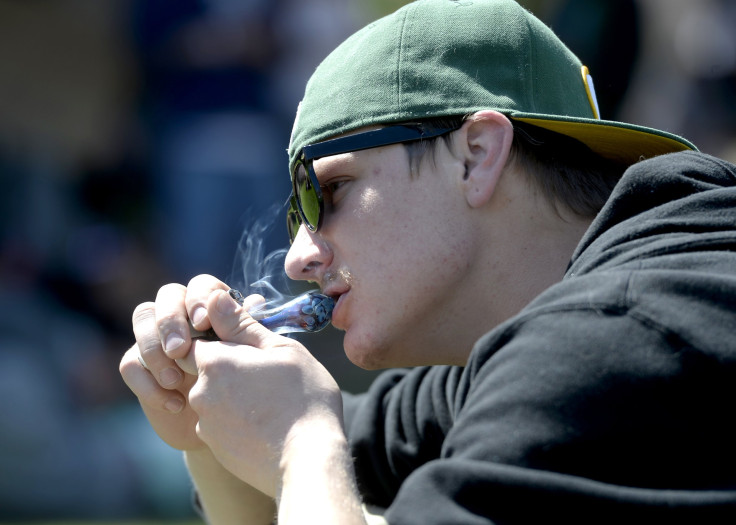
Starting on March 26th, residents of Washington, D.C. can possess and consume marijuana without fear of prosecution. The loosening of D.C. pot laws comes after voters passed a ballot initiative last November. Anti-prohibition campaigners argued that marijuana laws were outdated. They cited wasted police time squandered on arrests, and racial imbalances in marijuana prosecutions. Black residents of the Washington were eight times as likely to be arrested by police.
In Colorado, where marijuana was decriminalized in 2014, a pro-marijuana group release a report on how new marijuana laws have impacted police resources and racial profiling. As in Colorado, D.C.’s laws allow for marijuana possession, but prohibit smoking weed in public. How will decriminalization change the District of Columbia? Two years on, Colorado’s legalization experiment has yielded hard data on changes in arrests and prosecutions. Unsurprisingly, marijuana busts are way down; posession by more than 90 percent and cultivation by 96 percent, according to a report by the anti-prohibitionist Drug Policy Alliance.
More Police Hours
The study also contained less-obvious points. For example, the drop in marijuana arrests coincided with a 23 percent drop in all drug-related arrests. The number of marijuana has dropped by 25,000 since 2010. For over-worked officers in Colorado’s police forces, that means more time to fight other crimes.
“The savings of the 25,000 arrests in the state of Colorado is a boon to public safety with a minimum of 7,812 extra policeman days,” said Stephen Downing, a retired Deputy Chief of the LAPD who spoke with the Latin Times. Those man hours, he says, “are now available for police to answer emergency calls and patrol high crime areas where there are crimes against property and crimes against persons.”
Downing based his calculations on a study of NYPD officers that showed an average 2.5 hours for arresting and processing drug suspects, which resonated with his law enforcement experience. Since those were arrests, as opposed to prosecutions, it’s a low estimate that excludes time testifying, and the burden on lab forensics and the court system.
An Impossible War?
Officer Downing’s career coincided with Nixon’s War on Drugs, which propelled the LAPD into an anti-drug frenzy, and the retired cop to the top of a narcotics task force. As a commanding officer, he had a bird’s eye view of counter-narcotics, and he didn’t like what he saw.
“Nothing we could do stemmed the flow of drugs,” he said. Downing says that he’s proud of his time as a police officer, but eventually became disillusioned with drug enforcement. Now Downing is a member of Law Enforcement Against Prohibition, where he is an Executive Board Member. He says many of his colleagues still support the War on Drugs. In his eyes, they just haven’t come around yet.
“It’s hard to admit that you spent a lot of time hurting people. It’s easy to justify what you’re doing using rhetoric. It’s easier to be proud of the culture you came from.”
Racial Profiling
While overall prosecutions were down, existing marijuana prosecutions are still skewed by race in Colorado. As in 2010, Black Coloradans are three times as likely to be prosecuted for crimes like smoking pot in public, according the Drug Alliance Police. That could have pessimistic implications for D.C.’s pot law, which maintains punishments that Colorado did away with, like selling weed. (A massive seed giveaway yesterday shows that many are willing to grow their own.) The rates for Latinos were not listed in the study, due to lack data.
“The statistical facts [nationally] are alarming. The use factor is about equal for all races. But the arrest rate is higher with African American, and then the next is higher with latinos,” Downing said.
Yet racial profiling isn’t necessary about overt racism on the part of officers. Downing points to structural elements of policing that make minorities more vulnerable to arrest. Whites use drugs indoors more often, while street and stup culture brings Blacks and Latinos under closer police scrutiny. In areas with higher levels of crime -- crimes against property and persons.
"Arrests are the number one cause of broken families, and that’s a driver of crime. It becomes a dark spiral,” Downing said. Racial profiling is a separate problem from prohibition, he says. Instead, it’s a structural problem driven by a poorly structured police force.
“Police agencies often measure an officer’s performance by arrests, and by felony arrest, especially if they have poor leadership. When California dropped pot down to a misdemeanor, you saw arrests drop, and drop again when it became only a ticketable offense.”
Downing pointed out another aspect of profiling that’s rarely discussed, and like twisting the 4th amendment it has little to do with the legalization of drugs. According to the retired officer, police often size up people they stop based on how economically prosperous the appear. It’s a key factor in deciding to stretch probably cause, and the right to search a citizen.
“Whether the officer says it out loud or not [he does this] when [a suspect asks ‘do you have probably cause?” Especially if he has a quota to meet or an arrest bonus to achieve, he’s going to ask “Can [the suspect] afford a lawyer? Can he give me a bunch of crap in court?”
Decriminalization of drugs might stem profiling related to posession, but it's up to tackle the underlying problem of quotas and class inequality in the court system. For those who might be quick to judge, Downing took a playful shot at the reporter, who admitted that his own work was judged by website hits.
“So, you are prone to get a little more provocative to get a bunch of hits, aren't you?”
Every job has its incentives, but not every job let's you put people in jail.
© 2025 Latin Times. All rights reserved. Do not reproduce without permission.



